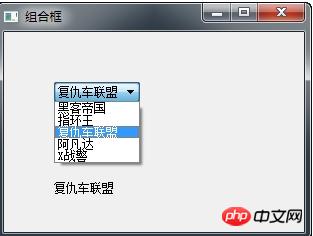
This article mainly introduces the combo box that you must learn every day in PyQt5. It has a certain reference value. Interested friends can refer to it.
QComboBox is a tool that allows users to select from a list of options. A control that selects an item.
#!/usr/bin/python3 # -*- coding: utf-8 -*- """ PyQt5 教程 这个例子展示了如何使用QComboBox部件。 作者:我的世界你曾经来过 博客:http://blog.csdn.net/weiaitaowang 最后编辑:2016年8月4日 """ import sys from PyQt5.QtWidgets import QApplication, QWidget, QLabel, QComboBox class Example(QWidget): def __init__(self): super().__init__() self.initUI() def initUI(self): self.lb1 = QLabel('黑客帝国', self) combo = QComboBox(self) combo.addItem('黑客帝国') combo.addItem('指环王') combo.addItem('复仇车联盟') combo.addItem('阿凡达') combo.addItem('X战警') combo.move(50, 50) self.lb1.move(50, 150) combo.activated[str].connect(self.onActivated) self.setGeometry(300, 300, 300, 200) self.setWindowTitle('组合框') self.show() def onActivated(self, text): self.lb1.setText(text) self.lb1.adjustSize() if __name__ == '__main__': app = QApplication(sys.argv) ex = Example() sys.exit(app.exec_())
There are five options in the combo box. The label control is used to display the selected option from the combo box.
combo = QComboBox(self) combo.addItem('黑客帝国') combo.addItem('指环王') combo.addItem('复仇车联盟') combo.addItem('阿凡达') combo.addItem('X战警')
We create a QComboBox widget containing five options.
combo.activated[str].connect(self.onActivated)
When the item is selected in QComboBox, we call the onActivated() method.
def onActivated(self, text): self.lb1.setText(text) self.lb1.adjustSize()
In the onActivated() method, we set the label control to display the text of the selected item. adjustSize() adjusts the size of the label.
After the program is executed

Related recommendations:
##PyQt5 The slider control QSlider_python## that must be learned every day
#PyQt4 implements a drop-down menu to select and print outPyQt5 must learn the switch button every day_pythonThe above is the detailed content of Combo box that you must learn every day in PyQt5. For more information, please follow other related articles on the PHP Chinese website!
 How to start mysql service
How to start mysql service
 How to skip network connection during win11 installation
How to skip network connection during win11 installation
 How to solve the problem that the phpstudy port is occupied
How to solve the problem that the phpstudy port is occupied
 How to repair win7 system if it is damaged and cannot be booted
How to repair win7 system if it is damaged and cannot be booted
 xenserver
xenserver
 Is Code Red a computer virus?
Is Code Red a computer virus?
 stackoverflowatline1
stackoverflowatline1
 How to cancel Douyin account on Douyin
How to cancel Douyin account on Douyin
 What are the differences between Eclipse version numbers?
What are the differences between Eclipse version numbers?




